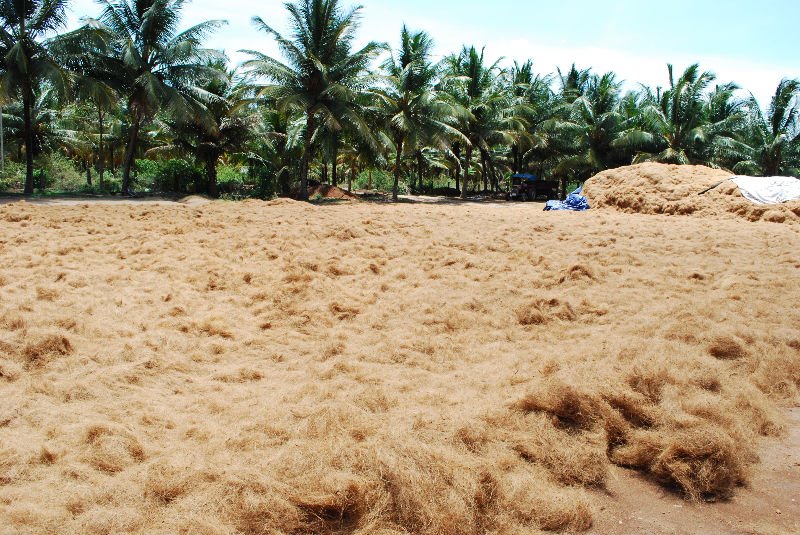Coir Pith
 Coco peat (cocopeat), also known as coir pith. coirfibre pith, coir dust, or simply coir, is made from coconut husks, which are byproducts of other industries that use coconuts.[1] Cocopeat primarily consists of the coir fibre pith or coir dust which is obtained by processing coconut husk and removing the long fibres. The cocopeat which is obtained can hold large quantities of water, just like a sponge. It is used as a replacement for traditional peat in soil mixtures, or, as a soil-less substrate for plant cultivation.[1] Coir waste from coir fiber industries is washed, heat-treated, screened and graded before being processed into coco peat products of various granularity and denseness, which are then used for horticultural and agricultural applications and as industrial absorbent. Usually shipped in the form of compressed bales, briquettes, slabs or discs, the end user usually expands and aerates the compressed coco peat by the addition of water. A single kilogram of coco peat will expand to 15 litres of moist coco peat.
Coco peat (cocopeat), also known as coir pith. coirfibre pith, coir dust, or simply coir, is made from coconut husks, which are byproducts of other industries that use coconuts.[1] Cocopeat primarily consists of the coir fibre pith or coir dust which is obtained by processing coconut husk and removing the long fibres. The cocopeat which is obtained can hold large quantities of water, just like a sponge. It is used as a replacement for traditional peat in soil mixtures, or, as a soil-less substrate for plant cultivation.[1] Coir waste from coir fiber industries is washed, heat-treated, screened and graded before being processed into coco peat products of various granularity and denseness, which are then used for horticultural and agricultural applications and as industrial absorbent. Usually shipped in the form of compressed bales, briquettes, slabs or discs, the end user usually expands and aerates the compressed coco peat by the addition of water. A single kilogram of coco peat will expand to 15 litres of moist coco peat.
Coir pith(coco peat) Block Specifications
Weight 5 Kg +/- 0.3 Kg
Size 30 x 30 x 13 cm
Compression ratio 5:1
Moisture content less than 20%
Electrical Conductivity less than 0.5 mS/cm
Expanded Volume 13 to 14 Litres per Kg
Packing 210 to 220 blocks per pallet
Loadability 20 pallets / 22 MT in one 40 feet HC container
Coir pith Briquette Specifications
Weight 650gm +/- 30gm
Size 20 x 10 x 5 cm
Compression ratio 8:1
Moisture content less than 20%
Electrical Conductivity less than 0.5 mS/cm
Expanded Volume 8 to 9 Litres
Packing 2000 briquettes per pallet
Loadability 20 pallets / 26 MT in one 40 feet HC container
Coir Pith
A spongy material that binds the coconut fibre in the husk, coir pith is finding new applications. It is an excellent soil conditioner and is being extensively used as a soil-less medium for agri-horticultural purposes. With its moisture retention qualities, coir pith is ideal for growing anthuriums and orchids. Available in raw form or converted into organic manure.